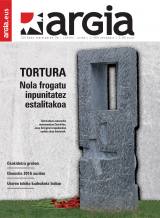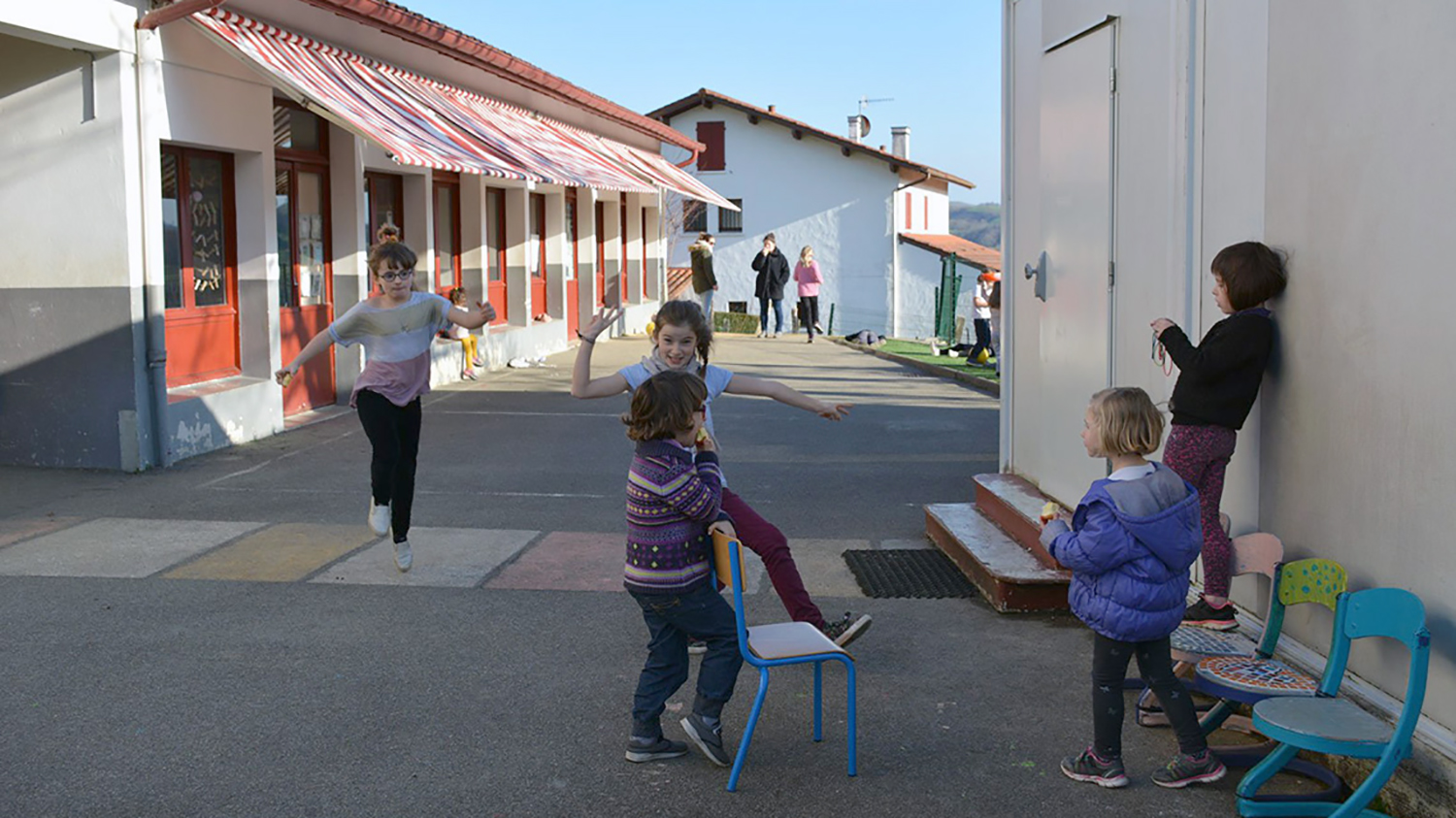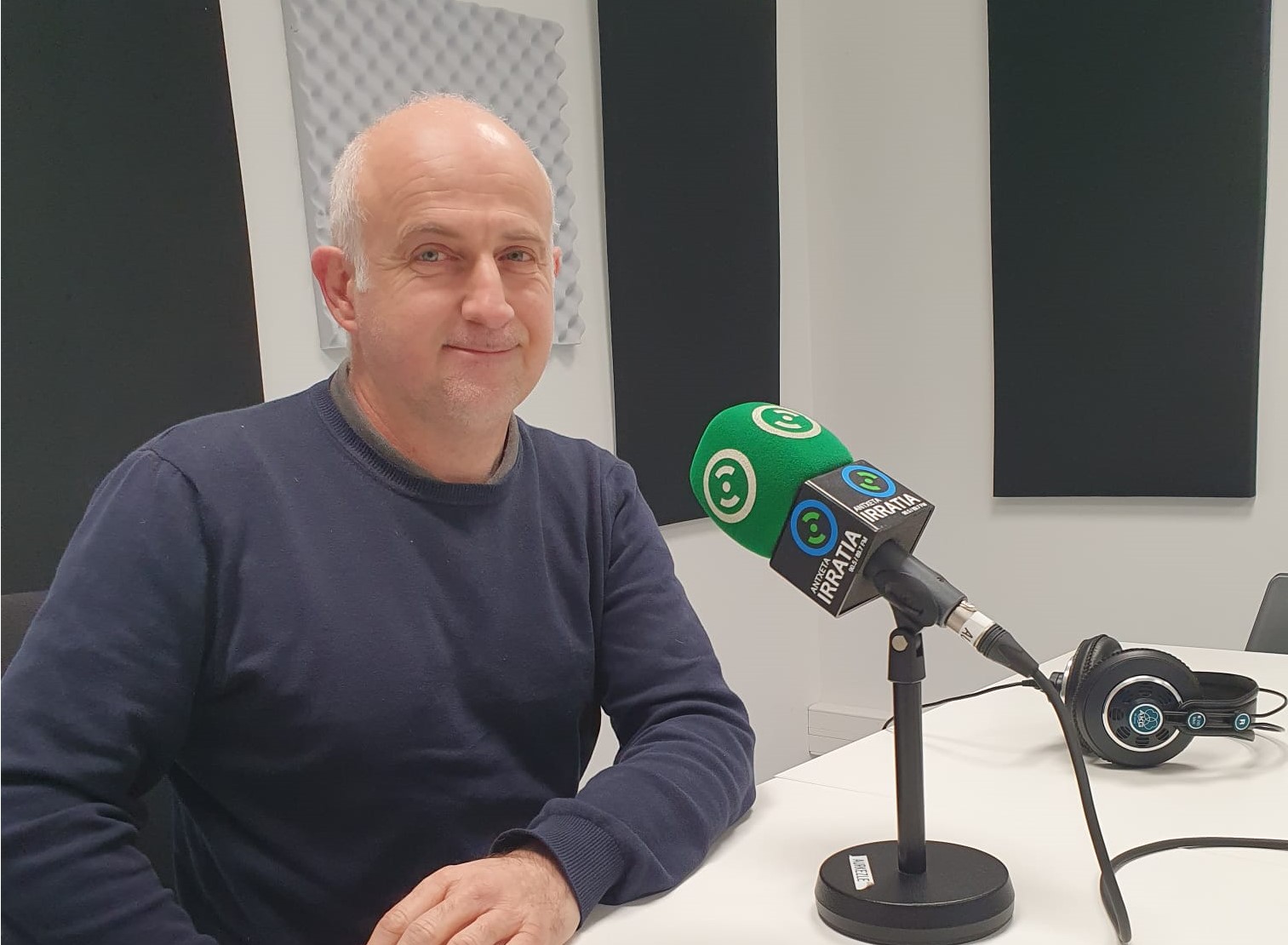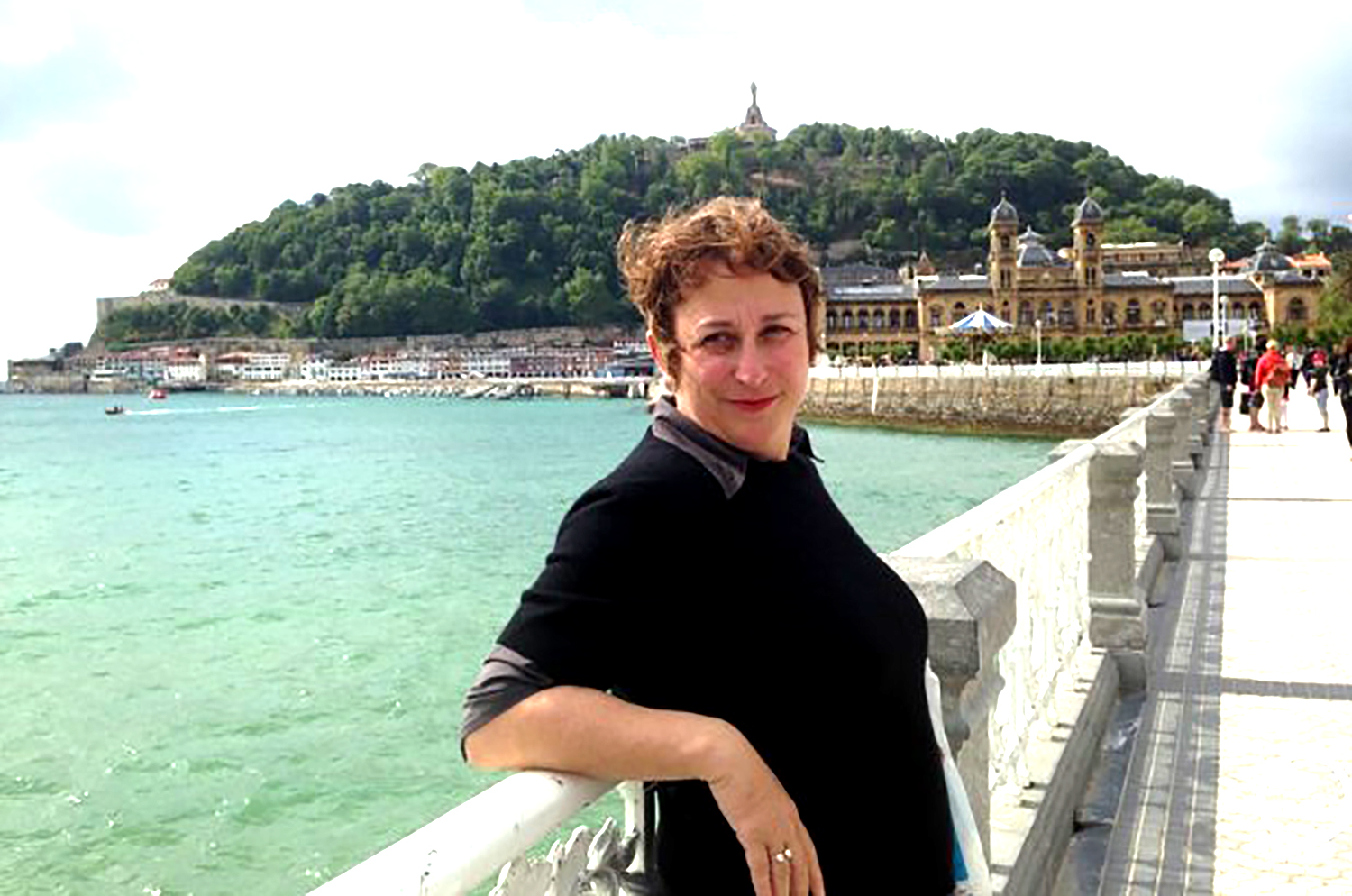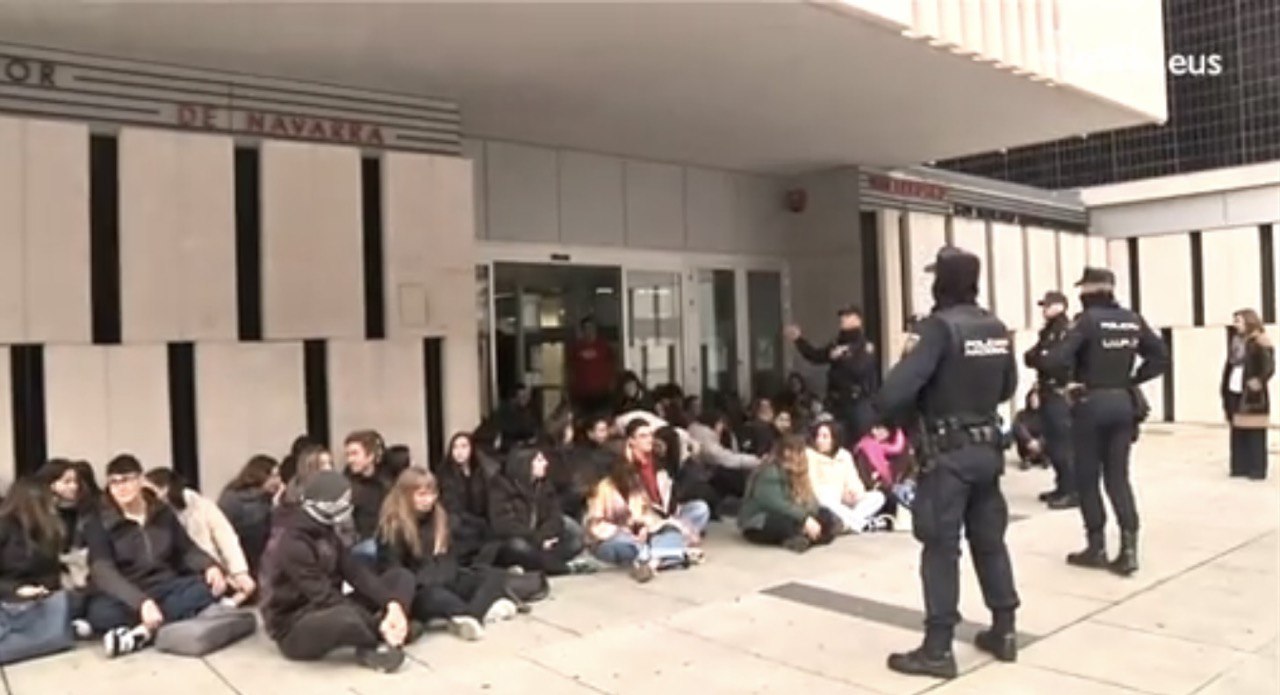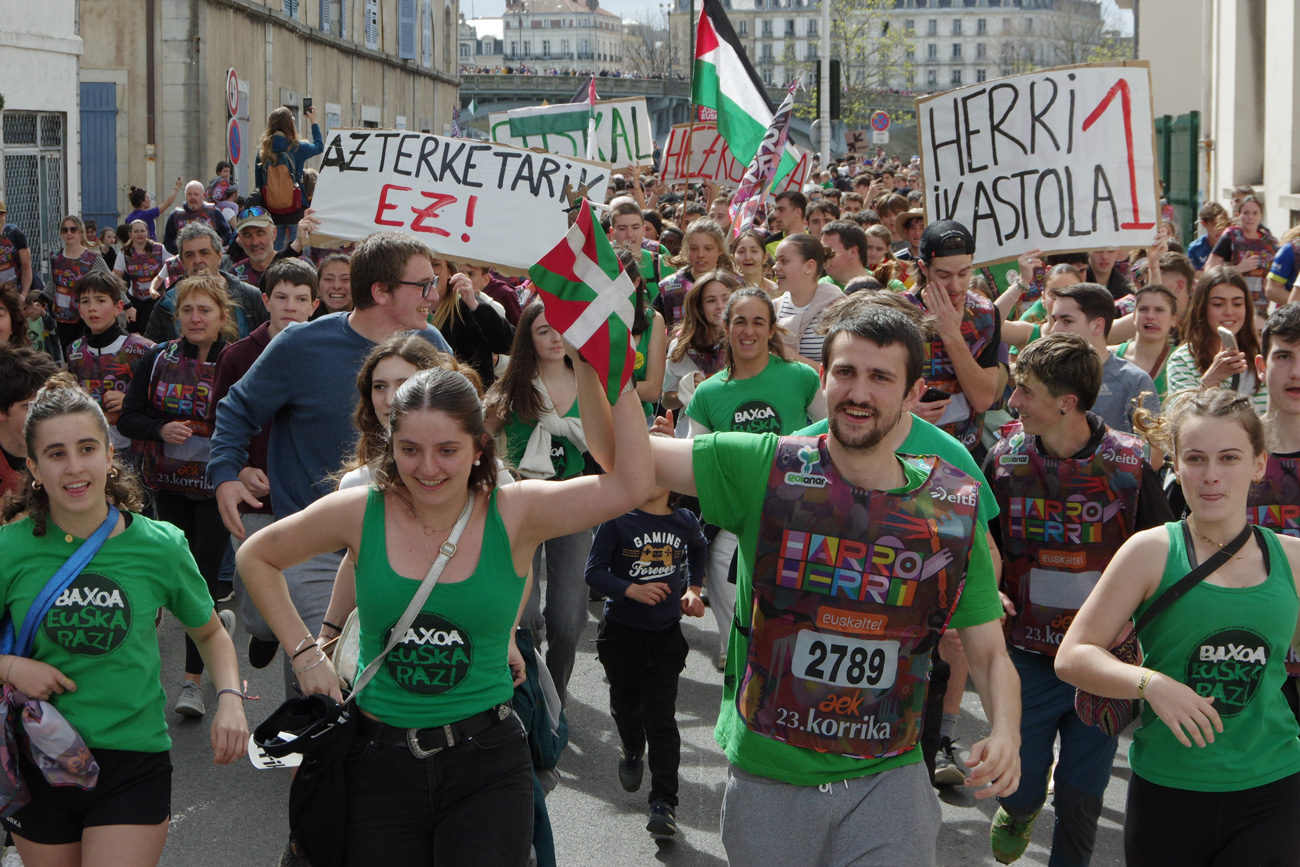For many, the new system is not good, nor is the previous one.
- We have analyzed the reform of the rhythms of the School of Children and Primary of France. We’ve come closer to Šíastola and the Lizardi de Hendaya Public School to assess the impact of the reform, on the eve of the 32nd edition of Herri Urrats, to be held on 10 May.
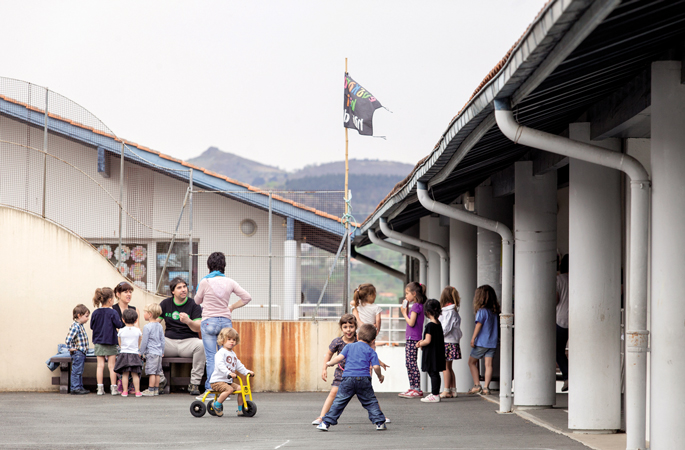
One of the characteristics of the school system is the distribution of time. In the French State, education has its own organisation for holidays, leisure and school hours. In addition to the holiday of two months of summer – eight weeks – every seven weeks, the students of the School of Children and Primary have two weeks of holidays: Santa Omía, Christmas, Winter and Spring holidays. The distribution of weekly and daytime hours has been very variable in recent decades. Between 2008 and 2014, the week lasted four days, there was no class on Wednesday. Following the reform, the distribution of current hours is 9 to 12 hours in the morning and 13 to 15 hours in the afternoon. On Wednesdays there is also a class, in the morning, of three hours. Depending on whether it is a public or private school, the beginning and end of the schedule is altered, even by districts. We have come to SEASKA and we have taken as a sample Tours Ikastola de Hendaia to know the characteristics of the reform.
National Education Concerns
French National Education is concerned about the poor results of its students. Now, with the reform, mornings are shorter and afternoons shorter. The reduction in afternoon hours has meant an extension of out-of-school activity time. This has led to a debate, particularly on the part of the parents and employees of the company. There are different views on reform, teachers have their own, and not everyone values change equally. Miren Arriaga is Deputy Director of Tours Ikastola de Hendaia: “The weakest point of this reform, the one that has been least worked on, is to put the right possibilities for extracurricular activities, both economic and personal.” For example, it is of the opinion that the People's House does not provide special assistance to ikastola. The NAP (Nouveaux Activités Perischolaire) contract with the Uda Leku partnership is already in the hands of the ikastola. After-school Activities (TAP) has become NAP.
However, for this professor the change has been positive: “I work with the elderly and the current schedule is more productive. For example, I give the themes of language, mathematics and the environment in the mornings. Before, one of those three hours was in the afternoon. For me lost.” Elementary school children learn better and the afternoon goes faster, in this case. There are other views, of course. Some parents think children are more tired: “Some teachers also say that, but we cannot attribute that to reform alone.”
In other words, when assessing the students' mood and results, in addition to the hours of learning and after-school activities, the influence of the children's hours at home must be taken into account. In any case, the parents of the family have decided that the schedule will be the new one. Some have not agreed to bring the children to school on Wednesdays in the morning.
Mauded Mariezkurrena serves as a teaching assistant. The Parent and Personal Coordinator is: “The ikastola workers at the beginning saw a rather confusing reform. At no time do we believe it to be for the sake of children, on the contrary, we see children very tired. They presented it as a reform created for the rhythm of children, and it’s nothing, it’s a lie or a lie.” Once the teaching staff has completed their schedule, in principle, children should perform special activities. That is to say, different from those carried out during school hours: “The teaching hours are the same as those of activity – they are two hours at noon and in the afternoon – there are no cuts or changes for the children.” Except on Mondays, the reform is one more hour for auxiliary staff. This day, children are provided with personalized assistance by specialized teachers. According to this representative of the workers, the impact of change is not so evident in adult children, perhaps in the smaller ones. In his opinion, the types of activities should be changed, bringing other auxiliary workers, to perform music, dance, theatre, circus or sports in the school, which are not performed in the school, that would be the real felling and monitoring: “You have to work on other activities, if there is no change in class. Before, recess time was from 15:45 to 16:30 hours. This time was not within the activities. Now they have activities, but they're not leisure. Children do not rest, they are called attention, but at that time they do not have a living mind, the day becomes longer and heavier.” Agurtzane Lana is a mother:
“My children are young. They are in the Children's School and in the first year of Elementary. After a good summer, they came home very tired of the Santa Comuna holiday in October. He was curious, couldn’t get up in the morning and was exhausted at night, unable to adapt to the current rhythm.” However, this father and mother have not noticed significant changes in their children due to the hours of each day. For many, the schedule is the same. At noon, the children, an hour and a room, are available to the companions. In the afternoon, in principle, it comes an hour earlier, but a number of unavoidable activities have been put in place. Parental hours are mandatory for many parents and children. The most notable change is that the class will be held on Wednesday.
Was the first system better? “There are no magic solutions, the only way to improve is to put means. According to the chronologists, it would be an excellent reform if the timetable were respected. But there are problems in reconciling the work of parents with the need of the family, children spend many hours in daycare. Now, on Wednesday, they do not come to leisure, they come to school, boys and girls are asked to be concentrated every day.” Despite the opposition of National Education, children are asked to work more: “It’s the first year, patches have been put on so that parents don’t go crazy. However, if we really implemented the reform, some children should go home before their rhythms are respected. On the contrary, it adapts, manages half-ways, without too much disrupting the way parents walk. The State has given money to implement the reform for a period of two years. We are in a phase of experimentation, at a height. And then what?” In short, this is basically a week similar to last year’s. Wednesday has changed, but it's class day, not leisure day.
Asking a Lizardi's father
We have also approached the public school Lizardi de Hendaya. We had talked to a teacher to talk to him, to an auxiliary worker and to a father. However, at the last moment, the principal of the school has denied the first two permission to speak with us. Refuse or recommend not to collect the permit. According to the professor, National Education prohibits them from talking to the media about any topic of the institution. However, we have spoken to Fabienne Pabois, the representative of the parents of this school: “Reform is right for me. The pace is better, because it has set the same and continued schedule every morning, because the learning method of children is not interrupted.” She has two daughters, seven years old, both in Division One. She prefers boys and girls to work in the same dynamic for five days: “Since Wednesdays come to school as a family there are no changes in weekend life. Last year we had to take our daughters to San Sebastian home to our grandparents and grandmothers.” He agrees to integrate activities (music, sport, dance...) in school, as some boys and girls do not perform extracurricular activities: “This year in school they have been able to do sport or circus, and for free. One of my daughters wants to do theater, but for her age we have not found this activity outside school, here yes, and in Basque.” The parent’s representative believes that the school’s teachers are not happy because they have to come on Wednesday. Ancillary workers, for their part, are happy with the NAP for the increase in staff, because the state has invested a lot of money to launch the reform.
Economic impact of the reform
Although the number of non-school hours is higher, the reform has not led to an economic improvement for the ikastola de Hendaia. There's a lot that hangs. There is always a problem with the House of the People and with the Commonwealth, not everything is well connected. The State has committed itself to funding it for two years, but then each school will have to pay its own.
Xabier Manterola is responsible for the Uda Leku association that organizes free time in Basque: “Reform is a good idea as long as the school hours and leisure times of children are combined well. Boys and girls live two rhythms of school and leisure activities”. However, she says that the school activity must be reconciled with the following activities and coexistence: "The mistake of the reform has been to order the change at the last moment, in a hasty manner. The connection between teaching staff and non-school animators has gone wrong. The September activities were decided in July.”
The reform has led to an increase in extracurricular activities and, consequently, in the number of workers in Uda Leku: “It’s false. We were working on Wednesday and with reform we have been reduced by more than half of the work. We have lost the jobs of three permanent workers. The working hours of the animators are the extra-terrestrial hours of Wednesday and holidays. Our working time has not increased, but the number of animators.” We have raised the idea of bringing outside activities (music, dance, sport...) to the schools, with the possibility that it is Uda Leku who takes care of it:
“Our pedagogical project is very contrary to this idea. We're not teachers, we're animators. If we were to say these issues outside school, we would become them. The goal of our project is to offer workshops, crafts, games in the classroom and outside, that children have fun. Parents should decide where to take the child. Bringing music, dance or sport is what they decide, not schools.” Manterola believes that, whatever the system, there are always contradictions: “First, boys and girls have the right to do nothing, they don’t have to be forced to learn. They are being asked more and more questions, they need free time. It’s the usual problem.” They want to change the education system in France, because Europe is changing.
Given the geographical peculiarities of the regions, summer holidays are expected to be even shorter. In the case of Ipar Euskal Herria, the South must be taken into account.
Hendaia's calendar is very special. Local education should be adapted to the peculiarities of Txingudi Bay. However, in the last decade there has been a change: “We noticed it in Easter. Of the 180 students there were only 20 missing in free time”, says the head of Uda Leku.
After talking to these people who work in education, we also want to highlight the following aspects: every child has his rhythm and the system is not good for everyone. There are many schools and models. Doing studies and reforms is fine, it is something other than putting them into practice. The change in rhythms has been good for some, but not from one hundred to one hundred. Even in the previous system, the rhythms weren't entirely correct. For many, this system is not good, and the previous one is not good either. The system is the same for everyone, but from one region to another the needs of the school change. The success of the school depends on many factors. It is the economy – its tourism – that commands. The holidays are organized accordingly. Boys and girls basically have to adapt to government policy and to the needs of society.
Lehen Mailako eskolako erritmoen erreforma 2013ko otsailaren 26an onartutako lege dekretu bati dagokio. 2014-2015 ikasturtean jarri da indarrean. Erreformak irakaskuntzaren erdiespena dauka helburu. Hezkuntza Nazionaleko Ministerioaren esanetan –2008tik lau egunetako eskola sistema zegoen indarrean–, Frantzia OCDEko (Ekonomia Lankidetza eta Garapenerako Antolakundea) 34 herrialdeetako ahulena da. Estatuan 144 eskola-egun ematen dira, Europako beste herrialdetako batez besteko 187 egunen aldean. Haurren erritmoetan adituek diotenez, denbora murritz hori ez da egokia ikasteko. Erreformarekin asteazken goizetan eskola eguna ezarri da. Asteko egunen ordutegia egokitu nahi dute eskolaz kanpoko jarduerekin, kirola, musika edota dantza aktibitateekin. Dekretuak dioenez, orduen banaketa egokiagoa da orain.
Erreformaren lerro nagusiak
Estatuan ezarritako esparrua ongi finkatzeak eskualdeetako nahiak betetzea erraztuko du. Erreforma Lehen Mailako eta Haur Eskolei dagokie, ordutegia hauxe delarik: lau eguneko bost ordu eta erdikoa, eta hiru orduko egun bat.
Erreformaren finantziazioa
Eskolaz kanpoko jarduerak antolatzeko eta laguntzeko diru-funtsa sortu da. Ikasle bakoitzeko 50 euro ezarri du Frantziako Gobernuak. Hiri eta landetako ikasleek 40 euro gehiago dute beren beharretarako, garraiorako adibidez.
Lurralde hezkuntza proiektua
Ministerioak PEDTaren (Lurralde hezkuntza proiektua) bitartez, erreforma eskualdeen berezitasunera egokitu nahi du. Testuaren arabera, hezkuntzan parte hartzen duten eragile guztiek koherentzian jardun behar dute. PEDTk lagundu behar du eragileen arteko engaiamenduan. Proiektua Kirol eta Gazteen Ministerioarekin elkarlanean sustatu nahi dute. Herriko Etxeak erreforman parte hartzen du.
Ikasle guztien arrakasta
2008tik erabili den lau asteko ikasturtearen ondorioz, frantziar ikasleek eskola erritmo desegokiak pairatu dituzte, euren erritmo biologikoen aurkakoak. OCDEko ikasleek 821 ordu egiten dute urteko. Erreformaren bidez, Frantziako ikasleek 864 ordu eginen dituzte eskolan, baina hobeto banatuta. Europako beste estatuetako bost eguneko egutegiarekin bat eginen dute.
Aurkako erreakzioak
Eskolako denboraren antolaketa berriak ez zuen ez irakasle ez guraso guztien oniritzia jaso lehen unetik. Hezkuntza Nazionaleko ministro Vincent Peillonek Erreforma test gisara esperimentatu zuen 2013an Lomme herrian. Emaitza argirik ez dago, eta eragile bakoitzak bere balorazioa egiten du. Irakaskuntzako zenbait sektorek –hainbat hautetsi barne– ikasturte honen hasieran, irailaren 3an, asteazkenean, Klase hutsen ekimenaren bidez Boikot nazionala egitera deitu zuten. Abuztuaren 14an eta irailaren 6an, berriz, Peillon-Hamon (Benoît Hamon da Peillonen aurretiko ministroa) deitu lege-dekretuaren aurka milaka herritar manifestatu ziren Parisen.
Eric Etxartek Seaskako lehendakarikide ardura hartu berri du urte hatsarrean, Antton Etxeberri eta Sophie Layusekin batera. Peio Jorajuriaren lekukoa hartu dute hirurek, eta Lehendakarikidetza taldea osatu dute.
The SEASKA federation has been able to enter the programme with a hundred more students than last year. With two-year-olds joining in the coming months, the limit of 4,300 pupils will be exceeded. In the first year, the increase is 33 students, but the most outstanding is the... [+]









